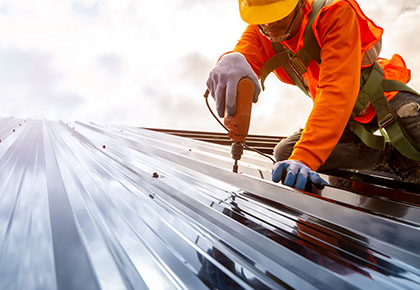-
Condo Board Communication: Communicate so Condo Residents Listen
Are residents in your condominium corporation always aware of upcoming events, construction projects and board meetings? Do they understand their responsibilities and the policies they need to comply with? -
Building Security Tips for the Holiday Season
Security risks increase exponentially during the holiday seasons for high-rise buildings. Many residents travel for the holidays, move to warmer weather during the winter months, or have an influx of guests and family members in and out. These factors make it easy for intruders to make it into the building, especially if there are no procedures in place to track the many people and deliveries in and out of the building. -
Planning and Executing Capital Improvement Projects
A successful capital improvement project requires a lot of planning to ensure that things go as smoothly as possible. Does your community know where to start? -
5 Surprising Reasons to Raise Your HOA Assessments
If your main concern is to avoid increasing assessments, you may want to reconsider. As a board member, one of your primary fiduciary responsibilities is to protect property values, and assessments are an investment that helps do just that. -
Don’t Be the HOA Bad Guy: 4 Proven Policy Enforcement Tips
Enforcing HOA policies is nobody’s cup of tea, but having good policy enforcement in place helps improve the resident experience and elevates your reputation. Follow these 4 principles for healthy policy enforcement: -
Post-Crisis HOA Cash Management: 3 Tips for Your Association
How do you manage collections and HOA funds after a crisis? Get 3 tips to help you plan for the future -
-

Reserve Funds, Assessment, or Loan: 3 Ways to Pay for a Capital Improvement Fee
Great capital improvements lead to better property values. Read on to see the three ways to pay for them and the pros and cons for each. -
Smart Financial Planning
Safeguarding a strata corporation’s operating and reserve funds is one of the main fiduciary duties of all board members, not just the treasurer. This means strata councils must protect the financial interests of the strata corporation and its members. -
Reserve Funds, Assessment or Loan: 3 Ways to Pay for Capital Improvements
Strategic capital improvements lead to better property values. Read on to see the three ways to pay for them and their pros and cons. -
Are You a Snowbird Heading South for the Winter? Learn How to Prepare Before Flying the Coop!
Do you escape to warmer weather down south once there’s a chill in the air and the leaves start to turn? If you’re a snowbird (or Winter Texan!), you need to know how to protect your home up north while basking in the southern sunshine -
Four ways to fund an HOA capital improvement project
Living in a residential community means around-the-clock routine maintenance to preserve the community and its assets. But there comes a time when one of your assets will reach the end of its useful life and require a replacement or significant repairs. -
How to create community policy: Enforcing rules without making enemies
Good rules make good community members. The most important factors in association policy making, whether for a condo, co-op, townhome or master-planned community, are clarity and sensibility. The board must be clear – and united – on the policy being created and then must communicate that policy to all residents. Whether the policy is about overnight guest parking, designated smoking areas, amenity usage or approved flooring, the basic steps to creating good policy and enforcing it successfully are the same. It’s important that everyone involved, including board members, residents and the management team, understand who is responsible for the various roles that are part of policy creation, enforcement and compliance. -
Keeping HOA and Condo Common Areas Clean During the Coronavirus Pandemic
During these unprecedented times, residents are spending the majority of their time at home to prevent the spread of COVID-19 and protect themselves and their loved ones from infection. One of their primary contact points with the outside world is in your HOA or condo common areas, where they can be at risk of contact with lingering coronavirus or even spread existing virus to other areas of the property. Read on for a comprehensive list of places to clean and how to clean them. -
Keep Your Annual Meeting From Derailing With These 5 Tricks
Your annual meeting is your community association’s most well-attended meeting of the year. That’s no surprise since it’s where residents get the most insights about their community and have an opportunity to elect their board members. But the large turnout also means it’s the meeting most likely to get off track. Keep your meeting from getting derailed by using these 5 techniques. -

Maintenance and Repairs vs. Capital Improvements – What’s the Difference?
Maintaining your buildings’ assets is not a one-size-fits-all proposition. The common areas require a broad range of routine maintenance and repairs to keep them looking good and operating smoothly. -
Promoting Fire Safety in Your Community Association
Part of your job as a board member is ensuring the safety of residents in your community association. To that end, it’s important to educate homeowners about possible fire risks and the steps they can take to prevent fire hazards in their homes. Chances are that fire safety isn’t top of mind for residents. However, home fires are more common than most people realize. -
5 Steps to the Best Reserve Study Firm
In our guide to capital improvements , reserve studies and their relationship to capital improvements and preventive maintenance were discussed at length. -
Updating Your Community Emergency Preparedness Plan for Pandemics
In the past, when planning for emergencies, a global pandemic was likely not on your list. While most board members did not anticipate a pandemic as something that needed a plan before COVID-19, it's now clear that communities need to develop a plan to address this and any future pandemics. Read on to learn how to build a community emergency preparedness plan with a possible resurgence of coronavirus and other potential pandemics in mind. -
5 Ways to Encourage a Sense of (the Larger) Community in Your Association
Your association doesn’t function in a vacuum. It’s part of a larger community. Having members actively engaged in your town or city is good for the association and adds to residents’ sense of community. Find out what your board can do to encourage residents to get more involved in their larger community. -
15 Things You’ll Want to Do Before Selecting an Insurance Agent
Insurance is one of the most important line items on your association's budget, but it is oftentimes the most expensive. Do you know how to select the right agent? -
How to Get Rid of Millipedes and How to Prevent Their Invasion
Ah, Florida nights. Perfect temperatures. And...a disgusting mass of undulating insects climbing up the side of your building? Learn how to get rid of millipedes. -
What to Know About an HOA Emergency Board Meeting During Trying Times
It's hurricane season again. As soon as June 1st rolls around, we are assaulted with hurricane preparedness pamphlets and emergency information at every turn. -
Estoppel Certificates: 7 Myths and the Real Facts
Estoppel certificates are a critical part of any real estate transaction and can be confusing. What's included, how are they created, what does it all mean? Learn more here.